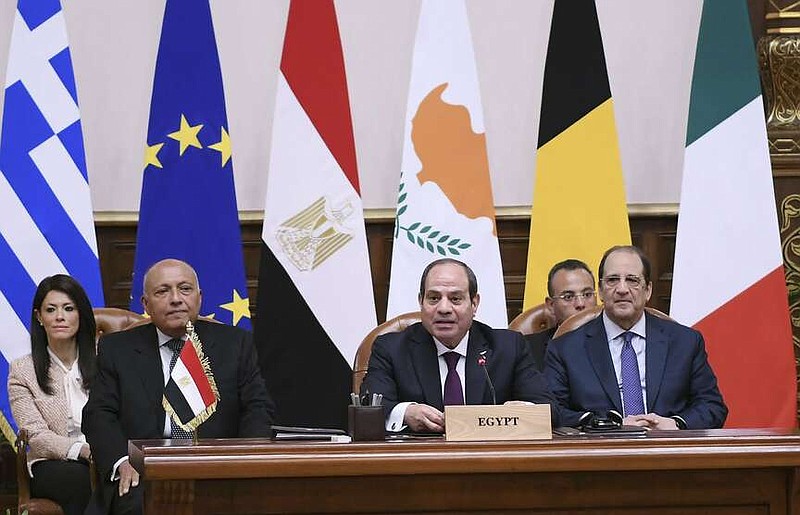CAIRO -- The European Union on Sunday announced an $8 billion aid package for cash-strapped Egypt as concerns mount that economic pressure and conflicts in neighboring countries could drive more migrants to European shores.
The deal, which drew criticism from rights groups over Egypt's human rights record, was signed Sunday afternoon in Cairo by Egyptian President Abdel Fattah el-Sissi and European Commission President Ursula von der Leyen. The ceremony was attended by leaders of Belgium, Italy, Austria, Cyprus and Greece.
"Your visit today represented a very important milestone in the relations between Egypt and the European Union," el-Sissi told visiting European leaders. He said the deal has achieved a "paradigm shift in our partnership."
The aid package includes grants and loans over the next three years for the Arab world's most populous country, according to the EU's mission in Cairo. Most of the funds -- $5.4 billion -- are macro-financial assistance, according to a document from the EU mission in Egypt.
The mission said the two sides have promoted their cooperation to the level of a "strategic and comprehensive partnership," paving the way for expanding Egypt-EU cooperation in various economic and noneconomic areas.
"The European Union recognizes Egypt as a reliable partner and its unique and vital geostrategic role as a pillar of security, moderation and peace in the Mediterranean, Near East and African region," a joint statement said after the summit.
The deal, known as the Joint Declaration, aims among other things to promote "democracy, fundamental freedoms, human rights and gender equality," according to the European Commission. Both sides will also deepen their cooperation to address challenges related to migration and terrorism.
The EU will provide assistance to Egypt's government to fortify its borders, especially with Libya, a major transit point for migrants fleeing poverty and conflicts in Africa and the Middle East. The 27-nation bloc will also support the government in hosting Sudanese who have fled nearly a year of fighting between rival generals in their country. Egypt has received more than 460,000 Sudanese since April last year.
The deal comes amid growing concerns that Israel's looming ground offensive on Gaza's southernmost town of Rafah could force hundreds of thousands of people to break into Egypt's Sinai Peninsula.
Egypt says there are 9 million migrants in the country, including about 480,000 who are registered refugees and asylum-seekers with the U.N. refugee agency. Many of those migrants have established their own businesses, while others work in the huge informal economy as street vendors and house cleaners.
The EU deal follows the template of those recently signed with Tunisia and Mauritania that pledged funds in return for fortifying their borders.
The package drew criticism from international rights groups over Egypt's human rights record.
"EU leaders must ensure that the Egyptian authorities adopt clear benchmarks for human rights," said Eve Geddie, Amnesty International's head of the European institutions office. Geddie pointed to Egypt's restrictions on media and freedom of expression and a crackdown on civil society.
Earlier this week in Brussels, European Commission spokesperson Eric Mamer acknowledged that there were issues in all these countries, but defended the partnerships nonetheless.
"Yes, we know the criticism related to human rights in those countries and it is obvious that this is an issue," he told reporters.
"Does that mean we should break off all relations? Would that lead to an improvement in the situation? Or should we try to find a way to work with those countries to improve the situation on the ground both for local populations and for migrants coming to those countries?" he said.
Information for this article was contributed by Renata Brito and Lorne Cook of The Associated Press.
